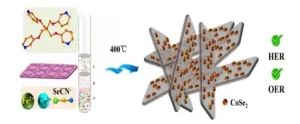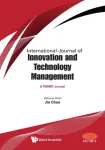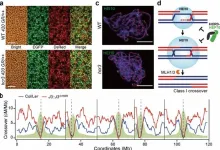(Press-News.org) The body's inability to produce enough insulin or use it effectively often results in type 2 diabetes (T2D), a chronic disease affecting hundreds of millions of people around the globe. Disease management is crucial to avoid negative long-term outcomes, such as limb amputation or heart disease. To counteract adverse consequences, it is crucial that patients have good knowledge about the day-to-day management of the disease.
A team of researchers in Portugal has now assessed how many patients – both insulin-treated and not insulin-treated – have this crucial knowledge about T2D. They published their findings in Frontiers in Public Health.
“Our main motivation was to contribute to the reduction of the existing disparity in the knowledge that diabetic patients have regarding their disease,” said first author Prof Pedro Lopes Ferreira, director of the Center for Health Studies and Research of the University of Coimbra. “With this study we evidenced the need to improve the disease knowledge of type 2 diabetic patients.”
Knowledge levels vary widely
To assess diabetes knowledge, the researchers used a knowledge test developed for people with type 1 or type 2 diabetes. Among other questions, the test includes sections about nutrition, signs and symptoms, and medication control. 1,200 people with diabetes participated in the study, of whom almost 40% were insulin-treated. The rest of the sample adhered to specific diets with some of them additionally taking non-insulin oral antidiabetics, while others relied on diet alone.
The results showed that many participants (71.3%) could answer food-related questions correctly, and that more than four out of five respondents demonstrated good knowledge of the positive impact of physical activity. More than 75% of respondents also knew about the best method for testing blood sugar levels.
In other areas, however, the researchers found that knowledge was severely lacking. For example, when asked which food item should not be used to treat low blood sugar levels, only 12.8% of participants answered correctly. The lowest percentage (4.4%) of correct answers was on a question concerning the symptoms of ketoacidosis, a potentially life-threatening, late-stage T2D complication.
“One of the main reasons for this disparity in knowledge is probably the behavior of health professionals and the areas that are prioritized when informing patients,” Lopes Ferreira explained.
Equipping patients with knowledge
The researchers found that the use of medication was one factor that impacted T2D knowledge. The percentage of correct answers was 51.8% for non-insulin treated patients, and 58.7% for patients using insulin. Looking at socioeconomic and demographic factors, being younger than 65 years, having a higher education, not living alone, and following a specific diet had a positive impact on disease knowledge.
The researchers said that their results highlight the need to improve T2D knowledge about certain aspects of the disease, for example blood sugar monitoring, which can help to avoid spikes in blood sugar levels that are associated with acute and chronic complications. Knowledge gaps within individual sections of the test are also something that needs to be addressed urgently, the team pointed out.
They also stated that studies with even more participants could help to better understand the role of the socioeconomic and clinical determinants of the disease. “We focused on patients’ own knowledge of their disease, rather than disease management being based solely on biological indicators. We hope that the results obtained will allow professionals to change the way they inform patients,” Lopes Ferreira concluded.
END
Many type 2 diabetes patients lack potentially life-saving knowledge about their disease
Scientists found that many people with type 2 diabetes know little about their condition, indicating a need to improve communication about the disease
2024-03-08
ELSE PRESS RELEASES FROM THIS DATE:
Small class sizes not better for pupils’ grades or resilience, says study
2024-03-08
Smaller class sizes in schools are failing to increase the resilience of children from low-income families, according to a study published in the peer-reviewed International Journal of Science Education.
Data on more than 2,700 disadvantaged secondary (high) school students shows that minimizing pupil numbers in classrooms does not lead to better grades. Reducing class sizes could even decrease the odds of children achieving the best results, say the study authors.
The quantity of teachers also does not increase the odds of pupils from the poorest backgrounds achieving academically, despite concerns over staff shortages in schools.
Instead, the researchers ...
Two-dimensional bimetallic selenium-containing metal-organic frameworks and their calcinated derivatives as electrocatalysts for overall water splitting
2024-03-08
Transition metal selenides have been considered to be a good choice for electrocatalytic water splitting. In addition, Metal-organic frameworks (MOFs) have been used to make catalysts with good electrocatalytic capabilities. Traditionally, the MOF-derived selenides are produced via the self-sacrificing MOF template methods. However, this strategy is high-energy consuming, and it is difficult to precisely control the structure and component homogeneity of the product during pyrolysis.
A research group of Wang-ting Lu, Fan Yu, and Yun Zheng ...
An increase in the number of extreme cold days in North China during 2003–2012
2024-03-08
How extreme weather and climate events change is an intriguing issue in the context of global warming. As IPCC AR6 points out, cold extremes have become less frequent and less severe since the 1950s, mainly driven by human-induced climate change. However, cold extremes could also exhibit robust interdecadal changes at regional scale.
A recent study by researchers from the Institute of Atmospheric Physics, Chinese Academy of Sciences, presents robust interdecadal changes in the number of extreme cold days in winter over North China during 1989–2021, and the findings have been published in Atmospheric and Oceanic Science Letters. ...
Open creativity: Increased creativity due to network relationships
2024-03-08
This paper's objective is to show that the network of frequent relationships that is established between agents in coworking environments, through weak ties, increases the generation of ideas. Thus, the present work argues that collaborative spaces can expand individuals' creativity, as they constitute a social hub for exchanging experiences and visions between individuals from different social and professional backgrounds [Blagoev et al. (2019)]. Through frequent relationships and weak ties, these social connections allow individuals to access different levels of insights and inspirations that make it possible to ...
Reptile roadkill reveals new threat to endangered lizard species
2024-03-08
The chance sighting of a dead snake beside a sandy track in remote Western Australia, and the investigation of its stomach contents, has led Curtin University researchers to record the first known instance of a spotted mulga snake consuming a pygmy spiny-tailed skink, raising concerns for a similar-looking, endangered lizard species.
Lead researcher Dr Holly Bradley from Curtin’s School of Molecular and Life Sciences said the discovery of the partially digested pygmy spiny-tailed skink within the snake had implications for the vulnerable western spiny-tailed skink species.
“Found about 300km east ...
Mutation solves a century-old mystery in meiosis
2024-03-08
Movies such as ‘X-Men,’ ‘Fantastic Four,’ and ‘The Guardians,’ which showcase vibrant mutant heroes, have captivated global audiences. Recently, a high-throughput genetic screening of meiotic crossover rate mutants in Arabidopsis thaliana garnered the interest of the academic community by unraveling a century-old mystery in the life sciences.
A research team, consisting of Professor Kyuha Choi, Dr. Jaeil Kim, and PhD candidate Heejin Kim from the Department ...
How a common food ingredient can take a wrong turn, leading to arthritis
2024-03-08
A University of Colorado Department of Medicine faculty member says she and her colleagues have identified the means in which bacteria in the digestive system can break down tryptophan in the diet into an inflammatory chemical that primes the immune system towards arthritis.
The research was co-authored by Kristine Kuhn, MD, PhD, Scoville Endowed Chair and head of the CU Division of Rheumatology. Several of her division colleagues collaborated on the paper, which was published in February in the Journal of Clinical Investigation.
Tryptophan is an essential amino acid found in many protein-rich foods, including meats, fish, dairy products, and certain seeds and nuts. It has many uses in the ...
Children with ‘lazy eye’ are at increased risk of serious disease in adulthood
2024-03-08
Adults who had amblyopia (‘lazy eye’) in childhood are more likely to experience hypertension, obesity, and metabolic syndrome in adulthood, as well as an increased risk of heart attack, finds a new study led by UCL researchers.
In publishing the study in eClinicalMedicine, the authors stress that while they have identified a correlation, their research does not show a causal relationship between amblyopia and ill health in adulthood.
The researchers analysed data from more than 126,000 participants aged 40 to 69 years old from the UK Biobank cohort, who had undergone ocular examination.
Participants ...
New treatment could transform the mental health of children with epilepsy
2024-03-08
A new psychological treatment for children with epilepsy, developed by a UCL-led team of scientists, has been shown to reduce mental health difficulties compared to standard care, a new study finds.
Mental health problems such as worries, low mood and behaviour problems are more common in children and young people with brain conditions such as epilepsy, than in the general population – with up to 60% of those with epilepsy having associated mental health disorders and many having more than one mental ...
Is obesity passed down the generations? Individuals are much more likely to be living with obesity in middle age if their parents were living with obesity, Norwegian research finds
2024-03-08
Is obesity passed down the generations? Individuals are much more likely to be living with obesity in middle age if their parents were living with obesity, Norwegian research finds
Embargo: 2301H UK time Thursday 7 March
*This is an early press release from the European Congress on Obesity (ECO 2024) Venice 12-15 May. Please credit the Congress if using this material*
Individuals have six times the odds of living with obesity in middle age if both their parents lived with obesity at that age, ...
LAST 30 PRESS RELEASES:
COVID-19 vaccination during pregnancy may help prevent preeclampsia
Menopausal hormone therapy not linked to increased risk of death
Chronic shortage of family doctors in England, reveals BMJ analysis
Booster jabs reduce the risks of COVID-19 deaths, study finds
Screening increases survival rate for stage IV breast cancer by 60%
ACC announces inaugural fellow for the Thad and Gerry Waites Rural Cardiovascular Research Fellowship
University of Oklahoma researchers develop durable hybrid materials for faster radiation detection
Medicaid disenrollment spikes at age 19, study finds
Turning agricultural waste into advanced materials: Review highlights how torrefaction could power a sustainable carbon future
New study warns emerging pollutants in livestock and aquaculture waste may threaten ecosystems and public health
Integrated rice–aquatic farming systems may hold the key to smarter nitrogen use and lower agricultural emissions
Hope for global banana farming in genetic discovery
Mirror image pheromones help beetles swipe right
Prenatal lead exposure related to worse cognitive function in adults
Research alert: Understanding substance use across the full spectrum of sexual identity
Pekingese, Shih Tzu and Staffordshire Bull Terrier among twelve dog breeds at risk of serious breathing condition
Selected dog breeds with most breathing trouble identified in new study
Interplay of class and gender may influence social judgments differently between cultures
Pollen counts can be predicted by machine learning models using meteorological data with more than 80% accuracy even a week ahead, for both grass and birch tree pollen, which could be key in effective
Rewriting our understanding of early hominin dispersal to Eurasia
Rising simultaneous wildfire risk compromises international firefighting efforts
Honey bee "dance floors" can be accurately located with a new method, mapping where in the hive forager bees perform waggle dances to signal the location of pollen and nectar for their nestmates
Exercise and nutritional drinks can reduce the need for care in dementia
Michelson Medical Research Foundation awards $750,000 to rising immunology leaders
SfN announces Early Career Policy Ambassadors Class of 2026
Spiritual practices strongly associated with reduced risk for hazardous alcohol and drug use
Novel vaccine protects against C. diff disease and recurrence
An “electrical” circadian clock balances growth between shoots and roots
Largest study of rare skin cancer in Mexican patients shows its more complex than previously thought
Colonists dredged away Sydney’s natural oyster reefs. Now science knows how best to restore them.
[Press-News.org] Many type 2 diabetes patients lack potentially life-saving knowledge about their diseaseScientists found that many people with type 2 diabetes know little about their condition, indicating a need to improve communication about the disease




